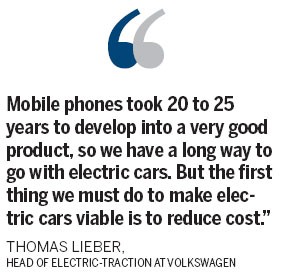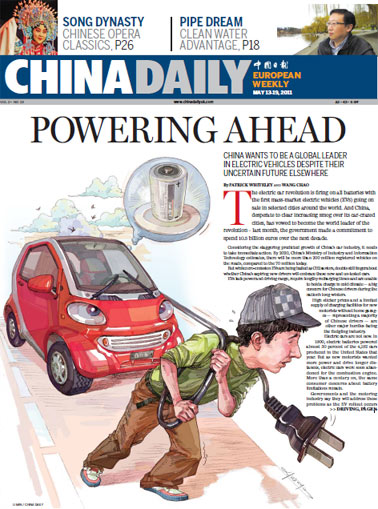Powering ahead
Updated: 2011-05-13 10:27
By Patrick Whiteley and Wang Chao (China Daily European Weekly)
The eastern city of Hangzhou, for example, plans to have 23,000 EVs on its streets by the end of next year and the city government plans to complete four charging stations, 38 express change stations and 3,500 charging poles.
Across the world, similar EV trial cities have become testing laboratories for motoring companies, which are closely monitoring their innovative, but relatively new battery technology.
Volkswagen, China's biggest selling foreign car brand, perhaps offers a realistic timetable of when electric cars will flow into the mainstream market.
Like many of the major automakers, VW is now trialing its EVs but does not plan to produce them on a wider scale until 2013-14. The first mass-produced electric VW sedan will not be ready until 2018.
Thomas Lieber, head of Electric-Traction at Volkswagen, compares the first breed of electric cars with the first range of mobile phones. "Mobile phones took 20 to 25 years to develop into a very good product, so we have a long way to go with electric cars," he told an EV conference in Beijing. "But the first thing we must do to make electric cars viable is to reduce cost."
|
 |
The high cost of many EVs - BYD's e6 will be priced at 300,000 yuan (31,580 euros) when released this year - has been blamed for slowing down the momentum of the new-energy vehicle movement. BYD is perhaps China's most famous electric carmaker after US investor Warren Buffett bought a 10 percent stake in the company in 2008.
A JD Power study of new vehicle buyers in China - and in major markets around the world - reveals that while many consumers are intrigued by the idea of owning an electric vehicle, they balk when they learn about the price.
While EVs produced by the bigger auto companies are relatively more expensive, electric cars made by lesser-known Chinese companies are providing cheaper options for new car buyers.
In March, Kandi Technologies, a Hangzhou-based EV developer, released a new 89,800-yuan EV, which only costs 29,800 yuan (3,138 euros) after the 60,000-yuan subsidy.
With more budget models becoming available and as fuel prices continue to rise there is still keen public interest in EVs, which cost a quarter of the price to run compared to a regular car.
According to a new study by market research firm Ipsos, more than 85 percent of car owners and potential buyers surveyed in 119 Chinese cities said they would consider buying petrol-electric hybrid cars. Some 66 percent would purchase a purely electric car.
Those who said no to hybrid or pure electric cars cited concerns about technological maturity and electric recharging facilities.
Jacques de Selliers, managing director of Going-Electric, an association for EVs in Europe, says considering that more than 80 percent of cars in the world travel less than 60km a day, at slow speeds with just one occupant, EVs are a perfect clean transport solution for Chinese cities.
But de Selliers says there must be incentives for the Chinese public to buy EVs, and infrastructure must be in place.
"Eliminating the odd-even number plates restriction for EVs may be the most effective incentive in the Chinese plan," he says.
E-paper

Green works
Wuxi becomes 'test case' for facing country's environmental challenges
The global rise of Chinese brands
China-EU trade on solid ground
ZTE banks on innovation
Specials

The song dynasty
There are MORE THAN 300 types of Chinese operas but two POPULAR varieties are major standouts

Cut above the rest
One of the world's oldest surgeons has performed more than 14,000 operations

From the ground up
Architect of Guangzhou Opera House has many projects under way, including 2012 Olympics.
